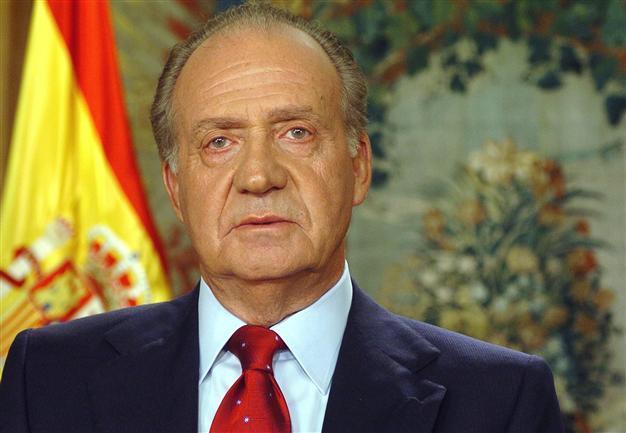Spanish King Juan Carlos abdicates
MADRID - Agence France-Presse

Spanish King Juan Carlos will abdicate in favour of his son Prince Felipe, the nation announced on June 2, 2014, ending a 39-year reign. AFP Photo
Spanish King Juan Carlos announced his abdication on Monday in favour of his son Prince Felipe, ending a 39-year reign that guided Spain from dictatorship to democracy but was later battered by royal scandals.The 76-year-old monarch, crowned in November 1975 after the death of General Francisco Franco, is stepping down dogged by health woes and with his popularity deeply eroded by scandals swirling around him and his family.
The king handed over a letter to Prime Minister Mariano Rajoy formally informing him of "my decision to abdicate the Crown of Spain".
A copy of the letter and a photograph of the monarch handing it over to the premier was released on the palace's Twitter account.
"His Majesty King Juan Carlos has just informed me of his desire to renounce the throne and begin the process of succession," Rajoy said in an impromptu announcement to the media.
"The reason for the king's decision is something that he wants to communicate personally to the Spanish people this morning," the prime minister said.
Juan Carlos hands over the throne to 46-year-old Felipe de Borbon, Prince of Asturias, a 1.98-metre (six foot six inches) tall, former Olympic yachtsman, who has been relatively unscathed by the scandals that battered others in the family.
"I found the king convinced that this is the best moment to change the head of state in all normality and for the transition of the crown to the Prince of Asturias," the prime minister said.
Frequently smiling but more reserved than his father, Felipe had long suffered from comparisons with his father.
But Juan Carlos's image was dealt a blow after he took a luxury elephant-hunting safari to Botswana in April 2012 as his subjects struggled in a recession, with one in four people unemployed.
Further damaging the royal family's standing, a judge opened a corruption investigation in 2010 centred on former Olympic handball player Inaki Urdangarin, the husband of the king's youngest daughter Cristina, who has also been accused of involvement.
At the same time, Felipe's approval rating has risen.
Felipe wed former television presenter Letizia Ortiz, in a glittering ceremony in Madrid's Almudena Cathedral in 2004 after several previous romantic dalliances, including one with a Norwegian lingerie model.
Ortiz, a 41-year-old divorcee, was the first commoner to come in line for the Spanish throne.
Far from being a mere ceremonial figurehead, Juan Carlos played a determining role in Spanish modern history when he stepped up as the first crowned head of state in 44 years after Franco's death.
He defied the hopes of the Francoists for an extension of autocratic rule. Instead, he oversaw the creation of a new system of parliamentary monarchy, with a new constitution that was approved by referendum in 1978.
Juan Carlos was credited with helping defuse an attempted coup in February 1981 by soldiers who stormed into parliament shooting and who held lawmakers hostage for several hours.
The king's appearance on television urging support for the democratic government was instrumental in blocking the attempt.
"I knew that the soldiers were going to agree because I had been named by Franco," the king said later, adding that he knew most of the officers from his days in the military academy, and he was their commander-in-chief.
After the Madrid train bombings in March 2004, Juan Carlos and his wife Queen Sofia threw protocol aside at a memorial service when they comforted the families of some of the 191 people killed.
But the king's image was later tainted by scandal.
One of the most damaging was the corruption investigation targeting Urdangarin that erupted in 2011.
Urdangarin has appeared in court but denies any wrongdoing.
Cristina was linked to Urdangarin's business affairs and she was herself declared a suspect in January 2014 over related allegations of tax fraud and money laundering.
In 2012, many Spaniards were angered to learn that the king had taken a luxury elephant hunting trip to Botswana, seen as an unacceptable extravagance during a recession.
The Botswana trip, which came to light after he broke his right hip and was flown home for surgery, undermined the king's earlier declarations that he lost sleep thinking about unemployed young people.
Amid signs that public opinion for the monarchy was slipping in the economic crisis, the king apologised publicly for the trip as he emerged from hospital on crutches.
His medical problems raised further questions over his reign.
Between May 2010 and November 2013, he had surgery nine times: on a benign lump in his lung, his right knee, an Achilles tendon, a slipped disc, two operations on his right hip and three on his left.
In a poll published in January 2014 by centre-right newspaper El Mundo, the number of people with a high or very high opinion of the king fell nine percentage points over 2013 to 41 percent.
The number of people wanting him to abdicate in favour of his son Prince Felipe, 46, surged by 17 percentage points to 62 percent, according to the survey by pollster Sigma Dos.
















